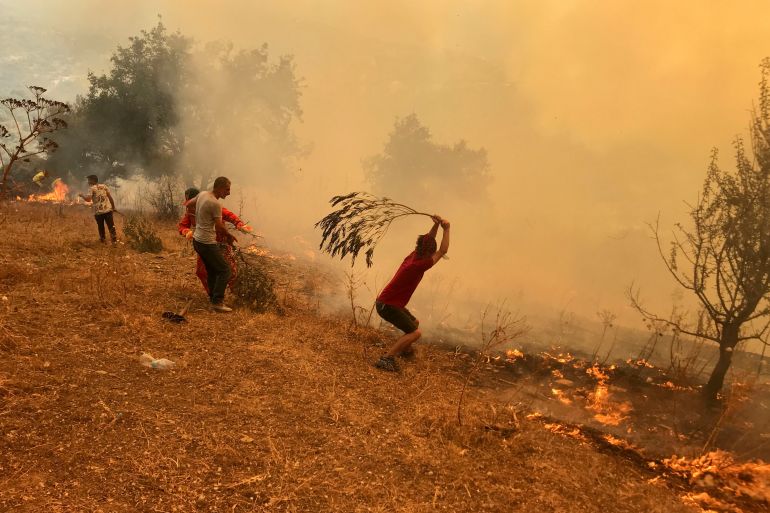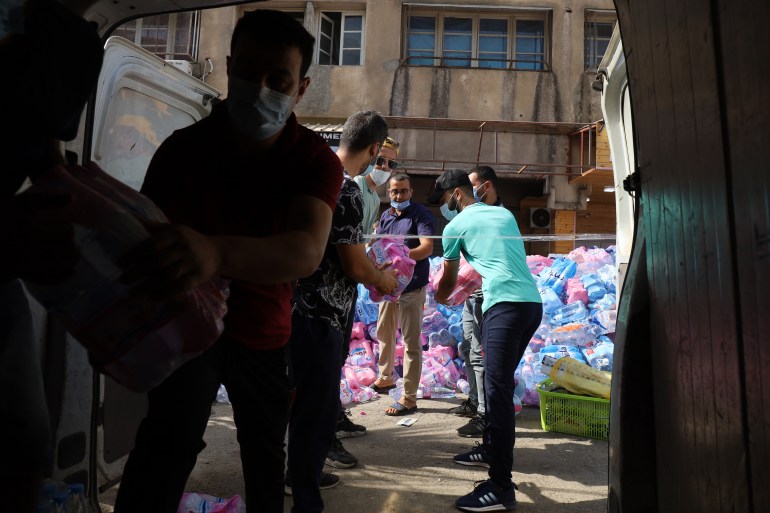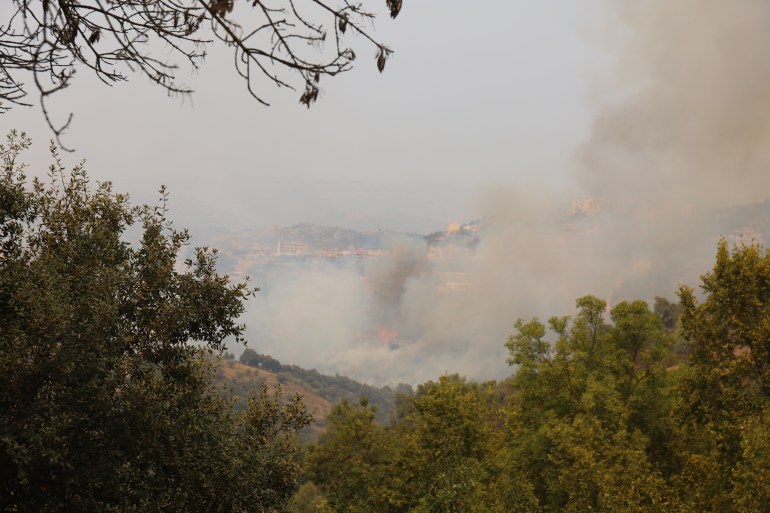Algerians decry lack of government support as wildfires rage
At least 69 people, including 28 military personnel, lost their lives in Algeria this week due to devastating wildfires.

Tizi Ouzou, Algeria – With bloodshot eyes and hoarse voices, young volunteers buzz around a line of shops along Krim Belkacem Boulevard in their fluorescent vests. Most of them have not slept in days.
The commercial street in Tizi Ouzou, in the northeastern Kabylie region of Algeria, is the main drop-off point for the hundreds of trucks delivering humanitarian aid to wildfire victims from all four corners of the country, and the reception and distribution of supplies have continued uninterrupted.
Keep reading
list of 3 itemsAlgeria recalls envoy to Morocco in row over Western Sahara
‘Martyrs’: Algeria wildfire toll rises to 65, 28 of them soldiers
Tizi Ouzou has been the central focus of humanitarian aid efforts as it is the province hardest hit by days of merciless forest fires which have ravaged Algeria.
“We started raising funds and volunteering during the last COVID-19 wave, so a lot of organisational mechanisms were already in place to fight these fires,” said Mokrane Nessah, a 54-year-old coordinator for one of the charities on site.
According to the General Directorate of the Civil Protection (DGPC), there were 100 active fires in Algeria on Thursday and 38 of them were located in Tizi Ouzou.
As the first fires broke out on Monday, the conditions helped them spread rapidly.
Temperatures climbed above 40 degrees Celsius (104F), nonstop 20kmph (12.4 miles per hour) gusts of wind fanned the flames, and forecasts in the Kabylie region suggested no rain was imminent.
However, if not for the activity around makeshift shelters, the city itself was eerily calm.
“The nearest fires are probably in Beni Douala,” a shopkeeper on the boulevard said, shaking his head.
“It is just a 20-minute drive into the hills from here. I have never seen anything like this.”
At least 69 people lost their lives this week, including 28 military personnel.

In the village of Beni Douala, amber smoke polluted a clear, blue sky, the smell of carbon and caramelised sap permeated the air, and particles of ash danced in the wind.
The centre of Beni Douala itself was untouched by the blaze, but nearly all of the adjacent villages were evacuated.
Many of those evacuated decried the lack of support from the government.
“Since yesterday, we have not seen a single police officer or gendarme!” a young volunteer named Fethi said, as he directed congested traffic in and out of the village.
“The only things we have seen are the helicopters above and firefighters, but no one came and instructed or helped us evacuate.”
As he spoke, semi-trucks equipped with giant metallic water tanks rumbled by, followed by pick-up trucks crammed with shovels and digging equipment.
Evacuated families gathered at the Akal Aberkane mausoleum, a historic site usually used for religious festivities.
The man in charge of helping them is Cherif Hamlid, a tall elder man, with a long white beard and blue eyes.
“There are more than 80 people here. They have everything they need. We have medical supplies, food and we sleep out in the open,” he said.
As he spoke, a small explosion could be heard a short distance away and immediately dozens of young men sprinted empty-handed in the direction of the thick, black smoke.

People have been criticising Algerian authorities online all through the week, saying their government lacks firefighting technology, such as amphibious aircraft.
As a result, the North African nation had to ask its European allies for help, but most were preoccupied fighting fires in Greece.
On Thursday, the European Union finally agreed to send two Canadair amphibious aircraft to help fight the fires in Algeria.
“To the Algerian people, I want to give you our full support. As of tomorrow [Thursday], two Canadairs and a command plane will be deployed in the Kabyle region, which is gripped by violent fires,” said French President Emmanuel Macron in a tweet on Wednesday.
Three more Canadair aircraft are expected to arrive in Algeria over the weekend from Spain and Switzerland.
Macron’s Algerian counterpart, Abdelmadjid Tebboune, stressed the importance of national unity in a televised address on Thursday evening.
“We must stay united! The Algerian state is indivisible and so are the people,” he said, adopting a forceful tone and periodically slamming his desk with his hand.
The president maintained that the fires were ignited by arsonists and announced that 22 individuals had been arrested, including 11 in Tizi Ouzou.
No evidence, however, has been presented against those individuals, leading activists to denounce a climate of paranoia that led to a tragic event in Larbaa Nath Irathen, a commune of Tizi Ouzou.
Young men suspected of starting fires were arrested and driven to the nearest police station.
A mob quickly formed and lynched one of the men, who would later be identified as Djamel Bensmail, a 35-year-old musical artist who came to Tizi Ouzou to help with humanitarian efforts.
Bensmail’s murder provoked widespread shock and anger. The Ministry of Justice announced that it would open an investigation.